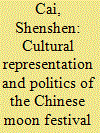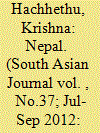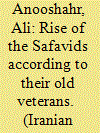| Srl | Item |
| 1 |
ID:
134183


|
|
|
|
|
| Publication |
2014.
|
| Summary/Abstract |
Nationalism in various forms has been a fixture of modern Chinese politics and society; however, its form has changed and over the past decade or so, the CCP has begun to appropriate China's cultural nationalism through its extensive use of propaganda and by other less nefarious methods. This paradigm shift embodies the deliberate manoeuvring that state nationalism is exerting on cultural symbols, concepts and legacies in China. Through imagery and emotionally laden political marketing that favour Party policy and rule, this form of nationalism surreptitiously caters to the cultural tastes of, and appeals to, the emerging middle class of contemporary Chinese society. It is a more nuanced and creative type of propaganda. Using the 2009 China Central Television (CCTV) Moon Festival (Mid-Autumn Festival) Gala as a case study, this paper examines Party-state appropriations of cultural nationalism. The Gala is a rich reservoir of moon-inspired traditional Chinese cultural elements, and the intriguing manoeuvring of these culturally bound images and iconography signifies a new propaganda strategy that combines poetic nostalgia, poignant romance and abstract philosophical pursuit, through which cultural elements are skilfully woven into a patriotic and nationalist appeal. These traditional cultural signifiers, illusions and fantasies serve the Party's political aims as it attempt to reinforce its legitimacy by forging a culturally bound national identity.
|
|
|
|
|
|
|
|
|
|
|
|
|
|
|
|
| 2 |
ID:
118554


|
|
|
| 3 |
ID:
137175


|
|
|
|
|
| Summary/Abstract |
This article studies an early Safavid chronicle, Futuhat-e Shahi by Amini Haravi. In 1521, the founder of the Safavid state, Shah Isma‘il, provided Haravi with a number of veterans from the early days of the Safavid uprising as informants. Their narrative presents an alternative view on the early career of the shah that differs from the dominant version current in modern scholarship. From the perspective of the Futuhat, the rise of the Safavids did not occur as a wild apocalyptic explosion, but was a carefully planned and cautious campaign run by experienced commanders who kept a tight rein on the teenage Shah Isma‘il.
|
|
|
|
|
|
|
|
|
|
|
|
|
|
|
|